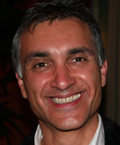Nader Shabahangi, Ph.D., is a licensed psychotherapist based in the Bay Area. Through his work at the AgeSong Institute and its elder communities, he has become an advocate for elders and for programs that provide more comprehensive elder care. His work also focuses on reevaluating societal attitudes towards aging. I spoke with Dr. Shabahangi about aging, elder care, and AgeSong’s upcoming conference.
 Liz: What is your philosophy on aging?
Liz: What is your philosophy on aging?
Nader: If you didn’t have the word “aging” to describe what happens to people as they move onwards in time, you could say people keep maturing, keep learning, keep growing, keep changing. Those would be the words I’d rather use than aging. The moment I say “aging,” there is a whole connotation that is mostly linked to decline—in the body, in power, in speed, in the number of miles I jog. I am pro-aging. I want to age because the more I age or mature, the better of a human being I become.
The idea that there is a prime of life is really very demeaning. It has a normative standard about what you look like and what your outer achievements are. It doesn’t talk about what I call the soft scale—what we universally consider lofty behavior, such as compassion, kindness, caring. Gandhi, Mother Theresa, Nelson Mandela, these are all people with qualities not so much about power and achievement and having, but more about being. There is a longer view to life.
Liz: How did you get interested in working with aging and elder care?
Nader: I was raised by my grandparents. From early on, the highlight of my day was to sit on my grandfather or grandmother’s lap and have them tell me stories about their lives. Just to look at my grandfather’s 70- or 80-year-old face and think, wow, look at how much this person has lived. So from childhood, I had this incredible appreciation and love for elders.

The AgeSong at Bayside Park elder community in Emeryville
When I got thrown into the world of assisted living in my mid-30s, I thought, this can’t be true; how is it possible that you have these beautiful, deep elders, tucked away, not part of society? I looked around and saw very few elders on the street, mingling with young people. I have lived in Italy, where you can go to any park and see people of all ages, but here I did not see any of that. I would tell elders, you have all this experience and knowledge; why are you tucked away? Often, I would hear, oh, I’m useless, I have no purpose. This came to me as a shock. Since then, I see my grandparents in every elder I meet, and the universe has conspired to help me make a difference.
Liz: How do you want to change people’s attitudes towards aging and elders?
Nader: Well, I am 54 years old. I look in the mirror and part of me is critical of the bags under my eyes, my hairline, the fact that I can’t see as well anymore. I can go into that decline/loss paradigm. But then I can say, wait a minute; I’m not going to go down that road. My not being able to see so clearly allows me to be inside more. My not having as much energy allows me to go more slowly, pay more attention to what’s around me and in me. I can look at what loss allows me to gain.
There is an active process of noticing your internal ageism, then really working with that inner critic and changing its viewpoint. Trees are in their fullest beauty when they are old, when there is weathering on the tree. Think of ripening, like fruit at its most delicious.
Liz: Have you encountered a lot of resistance to this shift in attitude toward aging?
Nader: Oh yes, there is a lot of resistance. You don’t shift a mindset without it. Even me; after 20 years of working with elders, I have my inner critic. Obviously, people are just beginning to be exposed to such a philosophy. The mainstream is mostly dominated by the biomedical paradigm, which states that aging is decline. But we need to question the norms, and ask who sets them. If you are measuring value based on the 20-year-old girls on magazine covers, based on how quickly you can operate an iPad, then that’s your standard.
It’s really a whole cultural shift. If we now say the prime of life is being an elder, then we have to say these qualities elders have are desirable to learn. People will work on becoming more selfless, more giving. Then self-understanding could be the highest goal in life rather than material achievement, power, standing.
My not being able to see so clearly allows me to be inside more. My not having as much energy allows me to go more slowly, pay more attention to what’s around me and in me. I can look at what loss allows me to gain.
Liz: What can you tell me about the upcoming Poetics of Aging conference, which AgeSong Institute is organizing?
Nader: Poetry means creating. I love poetry; I’m a big fan of Mary Oliver, whose poetry gets better and better, and I grew up with people like Goethe and Rumi, whose poetry got deeper as they aged. Poetry for me is how we go through life and keep writing stanzas. How do I see life in my 50s, in my 60s, in my 70s? I look at my path differently than I did 10 or 20 years ago. So the conference is really to make people aware, using arts, theater, etc., in order to have people look at their own aging process. Are they embracing or criticizing themselves?
The conference will be a place where we value who you are and your age. The term “elder” is not confined to older people. It can be anyone at any age. It depends how you feel inside. So celebrating your age, the fact that you have lived this many years, that kind of acceptance of who you are is what the poetics of aging is about. We live in a very ageist society where older people are marginalized; the only things that make the press are stories about diseases, ailments, older people eating up social security. Not the positive stories about what elders are creating and contributing.
Liz: Any final words of advice you’d like to impart to our SevenPonds readers?
Nader: Love yourself. Love who you are at any age, and treasure your life at any age. This movement to turn the whole cultural conception of aging on its head is just beginning; I hope it will become a movement that will be there to support you.
Liz: Thank you so much for speaking with us!
The Poetics of Aging conference will be held November 16th – 19th at the First Unitarian Universalist Church in San Francisco. Click here for registration information.

 An Interview with Dr. Nader Shabahangi
An Interview with Dr. Nader Shabahangi


 “Hand to Earth” by Andy Goldsworthy
“Hand to Earth” by Andy Goldsworthy
 Trans Remembrance Project Provides a Community of Grieving
Trans Remembrance Project Provides a Community of Grieving
 Caring for a Dying Loved One? Be Gentle With Yourself.
Caring for a Dying Loved One? Be Gentle With Yourself.














